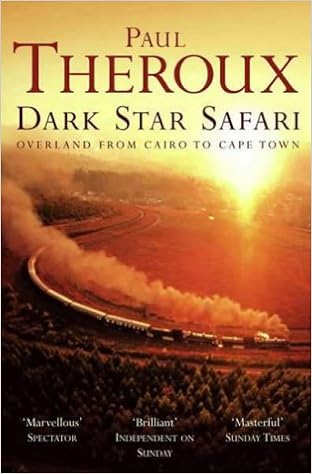Somewhere in "Dark Star Safari" Paul Theroux writes "How nice it would be, I thought, if someone reading the narrative of my African trip felt ... it was the next best thing to being there, or even better - because reading about being shot at and poisoned and insulted was in general less upsetting than the real thing" (p. 406).
Here is what the New York Times had to say back in 2003.
''Dark Star Safari,'' his latest travel book, charts the author's arduous journey through Africa, from Cairo to Cape Town, by truck, bus, ferry, train and bush taxi. Theroux sets out ''hoping for the picturesque,'' and at first finds plenty of it. The pyramids of Sudan leave him feeling humbled and uplifted. In the walled city of Harar, a Maltese nun cooks him a gourmet meal and beguiles him with tales of the lover she left for God. An Ethiopian, once a political prisoner, recounts how in his cell he translated ''Gone With the Wind'' on tiny sheets of cigarette-pack foil -- 3,000 in all -- and later published the translation.The NYT review goes on to chastise Theroux for egregious rage at the 'agents of virtue' of the aid bureaucracies and a tendency to 'go light' on the 'crimes of western imperialism'. But that's just their standard dogma; Paul Theroux is much more interesting than that.
Soon, however, the trip becomes a nightmare. Danger dogs Theroux at every turn, from armed Somali highwaymen in Kenya to land mines in Mozambique. Beggars importune, disease and squalor press in. A man with a runny nose sells oranges, ''handing the snot-smeared fruit to customers.'' Appalled by ''the filth, the dirt, the litter,'' beset by ''fungal infections, petty extortion, mocking lepers, dreary bedrooms, bad food, exploding bowels,'' Theroux narrates a Job-like ordeal during which he is ''abused, terrified, stranded, harassed, cheated, bitten, flooded, insulted, exhausted, robbed, lied to, browbeaten, poisoned, stunk up and starved.''
I was interested in Paul. He sees so much, so very acutely, yet does not draw conclusions. He is a 'how does it feel?' man, not a 'why is it this way?' analyst. No wonder his sons do so well on TV.
What he feels is an affinity with the rural Africa - the order and stability, in a timeless wilderness, of tribal subsistence farming. His fanciful desire is to end his days in that Africa and lose himself in small good works, teaching and writing.
The hurried West, with its shallow diversions and pointless buzz, has imposed itself as an alien force in Africa - aid & trade - creating slum cities and atomising traditional society. The result is disrespect, endless panhandling, crime, disease and violence. Only Africans can help Africa, Paul feels, but notes that every time Africans are left to their own devices - free of their subsidised and corrupt governments - they relapse to the timeless stability of subsistence farming.
Why is this? Paul doesn't know and more importantly, doesn't care.
---
In the end I had Paul Theroux marked down as an INFP. Not very introverted - he is perfectly happy to meet people and chat with strangers (the writer's obligation) - but equally content to blend in, shabby and unobtrusive, mostly the quietist observer. Also the only way to stay safe.
I had already read his follow-up travelogue, The Last Train to Zona Verde and was convinced that if anyone really wanted to understand the likely future of Africa they need not read the fantasies of The Economist or the optimistic deceptions of politicians, it was sufficient just to absorb Paul's immersive prose.
But I was wrong: as the NYT review showed, liberal prejudice can filter just about anything.

No comments:
Post a Comment
Comments are moderated. Keep it polite and no gratuitous links to your business website - we're not a billboard here.